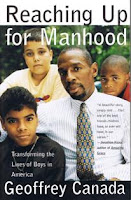
Boys need to be grounded in faith…Some of what we do has to be direct—talking to them about their beliefs and ours regarding God, life after death, heaven and hell...Some has to be more subtle—exposing them to great works of art music, and poetry that have faith as an underlying theme…We can have them read about Martin Luther King Jr., Mahatma Gandhi, Joan of Arc— such stories can be found in the histories of every race, religion, and ethnic group (104).
There are many reasons why I’ve found inspiration in this paragraph from Reaching up for Manhood, and it has nothing to do with the statements about faith and God. Rather, the passage speaks to my vocation as a teacher/writer and the urgency of storytelling.
Among the many insights of Carl Jung, the one that has had the greatest impact on me was his belief in the power of the story. Jung believed that everyone had a story to tell and that the denial of that story led to derangement. So, in a sense, you could say that Black people, and especially Black men and boys, have been deranged for the past five hundred years.
This is not to say that we’ve been hopeless. Throughout the years we have been blessed with remarkable storytellers: Jupiter Hammon Olaudah Equiano, Sojourner Truth, Harriet Tubman , Phyllis Wheatley, Booker T. Washington, Marcus Mosiah Garvey. Claude McKay, Zora Neale Hurston, Langston Hughes, Nicolas Guillen Gwendolyn Brooks , Aime Cesaire Louise Bennett Toni Morrison, Maryse Conde, Lorna Goodison, bell hooks, Octavia Butler, Jamaica Kincaid, Orlando Patterson, Derek Walcott, Kamau Brathwaite, Lorna Goodison, Bob Marley, and 2Pac.
But as great and grand as the stories that these men and women have written, they have not told my story. There are many similarities between their stories and mine, but the telling of a story sometimes depends on the “how.” And how I tell my stories is very different from many of these writers from whom I’ve learned my craft. For although there have been moments when I have sat at my desk, "Desiring this man's art, and that man's scope," I realize that I have my own story to tell and I’ve tried to tell them in my books: Benjamin, my son, Uncle Obadiah and the Alien, Grandpa Sydney’s Anancy Stories and my latest collection, Who’s Your Daddy?: And Other Stories. As you can see from the titles of my books, the themes of fatherhood, father surrogates, father-son dialogues, and mentoring—which are some of the themes in Reaching up for Manhood—feature prominently in my imagination. For better or worse, these are the stories I tell and they are mine.
But this is only a half of the narrative. As a teacher of composition and creative writing, my first duty is to bring a high sense of integrity to my craft. (And as many of my students and Joe McNair will attest, my favorite quote is from Socrates, “The unexamined life is not worth living.”) So my students always know from the first day of class that I will be asking them to tell me their stories. They soon come to learn that I don’t want stories that they think I’d want to hear, but that I want the stories about how they got here to Miami Dade College, about how they and I ended up in the same classroom--breathing the same air and sharing the same space. In demanding this kind of self-scrutiny, I am modeling the behaviors that I would like to see in my work and in my students, so that they in turn will exhibit the kind of authenticity that I seek in life and art.
This is easier said than done. For to be truly original takes courage. Sometimes this courage takes the form of disagreeing with your teacher. Sometimes it takes the form of humility—that as a teacher, you don’t have all the answers.
But this is what speaking our truth and telling our stories is all about. Yet we must always bear in mind that we are not entitled to anything—not even to have people listen to us or to buy our books. And this should leave us with sense of gratitude when we are shown kindnesses of book sales or to be invited to gatherings like these.
For in the end, all we can do is tell our stories and sing for ourselves. Sing in the darkness. Sing in the light. Just sing.
***
Text of a panel discussion at the 3rd African American Read-In: Reaching up for Manhood by Geoffrey Canada. Monday, February 2, 2009. 10:00 am to noon at the Lehman Theater, Building 5, Miami Dade College, North Campus.
The Panel discussion will be accessible via web stream www.mdc.edu/north/live
3 comments:
How did it go? I am a huge Geoffrey Canada fan. THis fall, I found excuses to play the "This American Life" baby college story to my freshmen AND my grad students: so inspiring.
Sounds like a great event! I hope it was fun.--Anne
Anne, it went very well. Great school involvement and many community leaders contributed to the discussion.
And fun too!
Support your Black poet.
Buy their books.
www.poetbeaudacious.com
Post a Comment